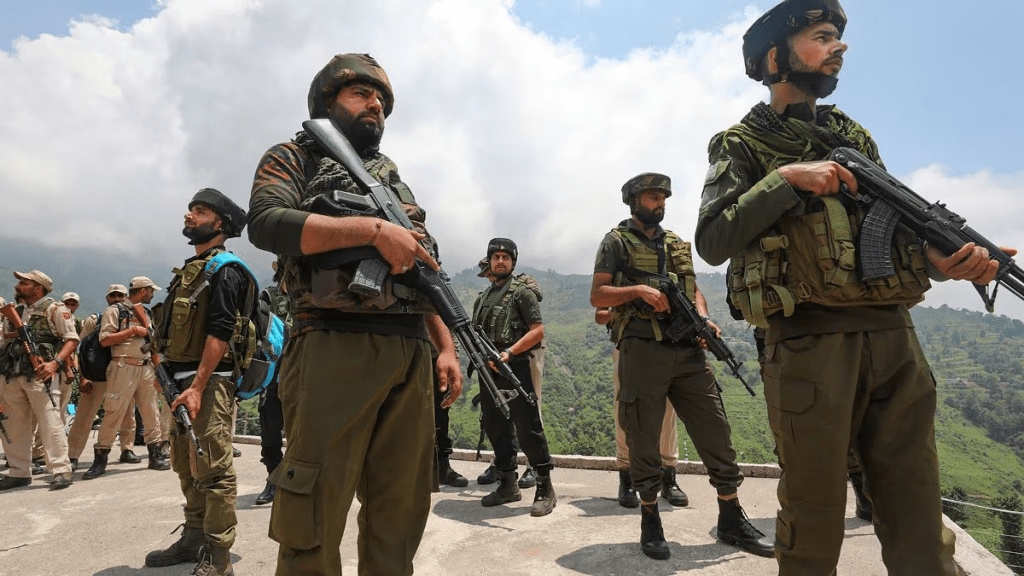By Manish Shukla
On Monday, a terrorist attack in Doda, Jammu, resulted in the martyrdom of one Army officer and three soldiers. The attack occurred during a military operation in the Desa forests, which was launched in response to intelligence indicating terrorist presence in the area. The terrorists opened fire on the army’s search team before fleeing the scene. This incident marks the sixth major terrorist attack in Jammu, perpetuating the region’s ongoing security challenges.
Recent attacks in the region include a July 8 incident in Kathua district, in which five soldiers were killed in an attack on an army truck, and a June 9 attack on a bus carrying pilgrims in Jammu, resulting in 10 deaths and 33 injuries. There has been a surge in terrorist incidents in Jammu over the past few months. The question is, what is the reason behind the consecutive terrorist attacks in Jammu and what strategy do the security forces have to prevent them?
The surge in terrorist attacks in Jammu has raised security concerns once again. The Indian Army has launched a large-scale search operation in the Desa Forests, which commenced on Monday night, aimed at tracking down and neutralizing the terrorists responsible for the recent attack in the region.
The attack on an army truck on July 8 has led experts to suspect that terrorists may have recently infiltrated from the Pakistan border adjacent to Kathua or Samba districts. The investigation is currently underway to determine the exact border crossing used by the terrorists involved in the attack on the military truck. Nothing can be ruled out at this point, and the probe aims to uncover the precise details. Drones and helicopters are being used to search dense forests and caves. Despite the efforts, no leads have been found regarding the terrorists’ whereabouts. Security forces have questioned over 50 individuals, but no concrete evidence has been uncovered yet.
The series of terrorist attacks in the past few months in Doda, Rajouri, Poonch, and Reasi districts of Jammu suggests a concerted effort by terrorist masterminds across the border to target the region. According to sources from intelligence agencies, there has been a significant surge in terrorist activities in the Rajouri-Poonch sector over the past two years, indicating a sinister plot to destabilize the region.
According to individuals familiar with intelligence reports from the Multi-Agency Centre (MAC), which consolidates inputs from all Indian intelligence agencies, multiple terrorist groups are currently active at launching pads along the border, ready to infiltrate. Some groups have been spotted near the Line of Control, while others are stationed at launching pads along the Pakistan border adjacent to Jammu, waiting for a favourable opportunity to infiltrate.
As per central government data, since the abrogation of Article 370, there has been a decline in terrorist attacks in Jammu and Kashmir. The region has witnessed a significant increase in tourist arrivals and a substantial decrease in stone-pelting incidents. The government is preparing to hold elections in Jammu and Kashmir in the near future. However, security experts believe that the recent attacks in Jammu are being carried out with a specific intention to convey that the situation in Jammu and Kashmir is not normal, despite the improvement in the security scenario.
Jammu has witnessed substantially fewer attacks compared to Kashmir over an extended period. Security experts believe that nearly two decades ago, when militancy was at its peak in Jammu and Kashmir, terrorists used the route from Pakistan-adjacent areas of Jammu to infiltrate. However, due to the army and security forces’ anti-terror and anti-infiltration operations, terrorist incidents in Jammu decreased significantly over a long period.
This month on July 11, a high-level coordination conference was held in Kathua to strengthen the security framework and enhance coordination and synergy among the Border Security Force (BSF), Punjab Police, and Jammu and Kashmir Police. This strategic meeting aimed to foster greater collaboration and information sharing among the participating forces, ensuring a more robust and effective security apparatus in the region. The meeting’s main objective was to conduct a thorough assessment of the current security landscape and develop effective strategies to address the challenges. It was decided for coordinated patrolling, leveraging advanced technology such as drones and night-vision devices to enhance border surveillance and security. Following presentations by DIG JSK Range, IG BSF Jammu, DIG BSF Gurdaspur, and SSP Pathankot, in-depth discussions were held to address key security concerns. The meeting resulted in proposals for several strategic initiatives to strengthen the border security framework.
Kathua district has a 88 percent Hindu population. Terrorists aim to disrupt the upcoming assembly elections by carrying out attacks in Jammu, besides Kashmir. To curb terrorist attacks in Jammu, additional central forces have been deployed, and surveillance along the Pakistan border is being strengthened.
The army is also fortifying the anti-infiltration grid at strategic locations to prevent terrorists from crossing into Indian territory. Moreover, coordination with police and intelligence agencies from other states is being enhanced to thwart the terrorists’ plans and ensure the elections are conducted smoothly.
Security experts believe that besides enhancing border surveillance, intelligence agencies need to strengthen their intelligence network along the border to gather timely information about any potential infiltration attempts.
With nearly two decades in Journalism, the author is an independent journalist. His expertise is in covering a wide range of crucial subjects, including internal security, terror-related cases, Jammu and Kashmir, India-Pakistan relations, and India-China relations.
Disclaimer: Views expressed are personal and do not reflect the official position or policy of Financial Express Online. Reproducing this content without permission is prohibited.

